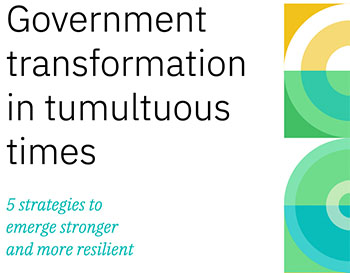
Five strategies to emerge stronger and more resilient

In the face of economic volatility, extreme weather events, and rapidly shifting demographics, the demand for public services has skyrocketed. The chasm between what citizens need and what governments can provide has widened.
Trust in public organizations is also on the decline, continuing a trend we’ve seen for decades. In 2022, only half (52%) of citizens trust their governments globally, according to Edelman. The Organisation for Economic Co-operation and Development (OECD) has measured a similar level of trust (51%) across its 38 member countries.
In response to massive disruption, government leaders have had to act quickly and decisively to show citizens they’re capable of navigating crisis and change. For example, when COVID-19 emerged as a global threat, governments had to roll out new programs almost overnight, while also creating and enforcing public safety protocols. And not every government was prepared to scale.
Public organizations that were still in the early stages of digital transformation had to prioritize IT investments to facilitate new public services and keep essential workers online—and much of that work is ongoing. In 2022, Gartner predicts global government IT spending will grow 6.5% to $557.3 billion. That figure is up roughly $100 billion over 2020.
How will government organizations need to evolve in the wake of this tech transformation? Where do they have opportunities to strengthen public trust? To gain a better understanding of how governments can succeed in a time of upheaval, the IBM Institute for Business Value worked with the IBM Center for The Business of Government to host the Gov 2025 event in November 2021.
In an open forum held over two days, hundreds of public and private sector leaders brought their perspectives, ideas, and expertise on what it will take to protect, support, and empower citizens in an uncertain future.
Participants from six continents and 52 countries came together to identify innovative solutions to persistent public sector problems, not just those highlighted by COVID-19. Participants discussed how to modernize government operations, empower and develop talent, and keep public data and systems secure. They also highlighted the importance of transparency, ethics, and sustain- ability in every aspect of government work.
The expert opinions and solutions presented were complex, but their overall sentiment was positive—79% positive. While they were concerned about the challenges in front of them, they demonstrated a hopeful outlook on what could be achieved, especially with the right blend of principles, technology, and leadership.
“Government leaders surprised even themselves by how fast they could move when under pressure,” said one participant. “We essentially saw 10 years of innovation in 2 years. The key now is to maintain the momentum and pace of innovation.”
What will it take to get there? While each country comes with its own unique challenges and constraints, we analyzed the conversations from the event to identify five urgent issues that government organizations must address to continue the steady march of progress:
- Scale services while prioritizing user experience
- Achieve sustainability goals through collaboration
- Empower the workforce of the future
- Modernize cybersecurity
- Develop ethical data and technology practices



